
by BreakBite Editorial Wing | Jun 21, 2024 | Startup Insights
What is Burn Rate?
Burn rate is a critical financial metric for startups, representing the rate at which a company spends its capital to cover its operating expenses before generating positive cash flow. It essentially measures how quickly a startup is “burning” through its cash reserves.
Types of Burn Rate:
- Gross Burn Rate: The total amount of cash a company spends each month on operating expenses, including salaries, rent, utilities, and other overhead costs.
- Net Burn Rate: The amount of cash a company loses each month, calculated as the total revenue minus total expenses. This figure is more critical as it indicates how long a company can sustain its operations with its current cash reserves.
Why Burn Rate Matters:
Burn rate is a key indicator of a startup’s financial health and sustainability. It helps entrepreneurs and investors understand how long a company can operate before it needs to secure additional funding. A high burn rate can indicate potential financial distress, while a low burn rate suggests efficient management of resources.
How to Calculate Burn Rate:
Example Calculation:
Let’s say your startup spends $50,000 per month on operating expenses and generates $10,000 in monthly revenue.
- Gross Burn Rate: $50,000 per month
- Net Burn Rate: $50,000 (expenses) – $10,000 (revenue) = $40,000 per month
Managing Your Burn Rate:
- Monitor Regularly: Keep a close eye on your burn rate by tracking your expenses and revenue monthly. Regular monitoring helps in making timely adjustments.
- Cut Unnecessary Costs: Identify and eliminate non-essential expenses. Consider downsizing office space, renegotiating vendor contracts, or cutting discretionary spending.
- Increase Revenue: Focus on strategies to boost sales and revenue. This could include enhancing your marketing efforts, expanding your customer base, or upselling to existing customers.
- Extend Runway: Consider ways to extend your financial runway, such as securing additional funding, applying for grants, or deferring certain expenses.
- Optimize Operations: Streamline your operations to improve efficiency. This might involve adopting new technologies, automating processes, or improving team productivity.
Communicating Burn Rate to Investors:
Investors often ask about a startup’s burn rate to gauge its financial health and runway. Be prepared to discuss your current burn rate, the measures you’re taking to manage it, and your plans for future financial sustainability.
Example Question from Investors:
- Investor: “What is your current burn rate, and how long is your runway?”
- Entrepreneur: “Our current gross burn rate is $50,000 per month, with a net burn rate of $40,000 per month. With our current cash reserves of $500,000, we have a runway of approximately 12.5 months. We are actively working on increasing our revenue and reducing non-essential costs to extend our runway further.”
Understanding and managing your burn rate is crucial for the survival and growth of your startup. By keeping a close watch on your expenses and finding ways to increase revenue, you can ensure that your startup remains on a sustainable financial path.
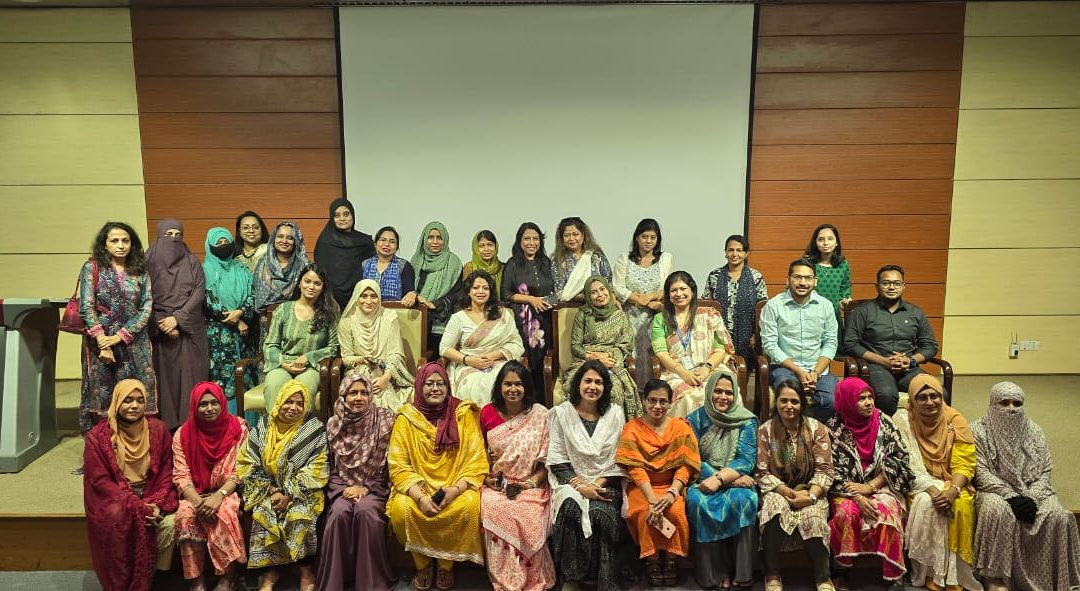
by BreakBite Editorial Wing | Jun 3, 2024 | WSME Business Insights
Successful Completion of 6th Physical Workshop on Mental Health at NSU Campus
Date: June 3, 2024
Location: North South University Campus
The Women Entrepreneurs Business Support Center, a key component of the We-Fi project under the World Bank, successfully conducted its 6th physical workshop on Mental Health on June 3, 2024, at Audi 801, North South University Campus. Organized by BreakBite in collaboration with North South University, this workshop is part of our ongoing efforts to support and empower women entrepreneurs.
Trainers and Keynote Speakers:
- Dr. Farzana Nahid, Assistant Professor, Dept of Marketing and International Business, NSU
- Dr. Mahmuda Muhsina Bushra, Psychotherapist, City Hospital
- Ms. Samira Rahman, Lecturer, Dept of Marketing and International Business, NSU
Session Moderator:
- Tilka Farzana, Lecturer, Department of Marketing, NSU & Partner, Wed Window
Dr. Farzana Nahid, the keynote speaker, highlighted the significant benefits of mental health awareness. She shared real-life experiences from her work as a counselor, demonstrating its impact on both personal and professional lives. Dr. Nahid emphasized the importance of prioritizing self-care as an essential tool for helping our loved ones.
Dr. Mahmuda Muhsina Bushra, a psychotherapist and trainer consultant with over 20 years of counseling experience, focused on women’s well-being and the importance of stable mental health. She conducted a mini meditation session, teaching women about self-love and techniques to overcome guilt, fear, and negativity. In her question-and-answer session, she addressed various issues affecting women in society and family. Her guidance and insights are expected to enlighten women entrepreneurs, benefiting them and encouraging a healthier lifestyle.
Another panelist, Ms. Samira Rahman, mentioned that mental health is a state of well-being that enables people to cope with stress. As she explained, stress is not always harmful; moderate stress can enhance task completion and problem-solving by providing energy and a sense of urgency, thus improving focus. This type of positive stress, or eustress, fosters resilience and helps maintain balance through anticipation and excitement. She also discussed effective stress management strategies, such as maintaining a daily schedule with planning apps or calendars, to reduce feelings of being overwhelmed and to improve overall well-being.
The workshop saw the active participation of 60 women entrepreneurs who shared their personal challenges and difficulties faced in their entrepreneurial journeys. Prominent figures such as Mr. Asif Ahnaf, CEO of BreakBite, Ms. Rakshanda Samin, Coordinator of WeFi project and Adnan Ahmed, CMO of BreakBite, were also present at the session, demonstrating their support for this vital initiative and engaging with the participants.
This workshop emphasized the importance of mental health and well-being for women entrepreneurs, equipping them with tools and techniques to manage stress and improve their overall mental health. The Women Entrepreneurs Business Support Center, as part of the We-Fi project, continues to dedicate itself to empowering women and creating a supportive community for their growth and success.
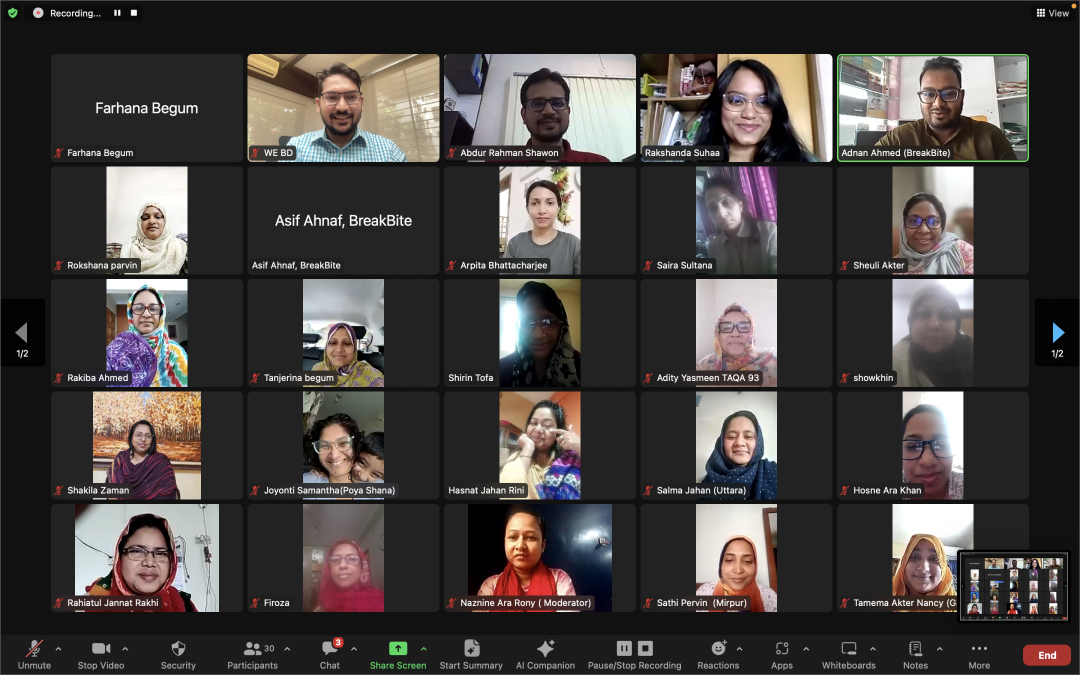
by BreakBite Editorial Wing | May 28, 2024 | WSME Business Insights
Successful Online Q&A Session on Customer Support & Communication
Date: May 28, 2024
Time: 12:00 PM, Dhaka
The Women Entrepreneurs Business Support Center, a key initiative under the We-Fi project of the World Bank, successfully hosted an enlightening online Q&A session on Customer Support & Communication on May 28, 2024. The session, led by Abdur Rahman Shawon, Founder and CEO of Pendulum Motion, provided invaluable insights and strategies aimed at enhancing the customer service practices of women entrepreneurs.
Speaker:
Abdur Rahman Shawon, Founder & CEO, Pendulum Motion
The discussion began with Abdur Rahman Shawon sharing his journey of establishing a customer service business. He emphasized the critical importance of understanding what “customer” and “service” truly mean. Shawon prompted participants to reflect on their interpretations, setting the stage for a deeper exploration of effective customer service strategies.
Key discussion points included:
- Customer Service Strategy: Shawon explained that a robust customer service strategy is essential for any business aiming for long-term success. He discussed the importance of having clear protocols and procedures in place to handle customer interactions efficiently.
- Customer Behavior: Understanding customer behavior is crucial for providing tailored support. Shawon highlighted techniques to read and respond to customer needs, emphasizing empathy and active listening.
- Necessity of Loyal Customers: Shawon underscored the value of loyal customers, explaining how they can become brand advocates. He shared strategies to cultivate loyalty through consistent, high-quality service and personalized engagement.
- Turning Negative Experiences into Positive Ones: Shawon provided actionable steps to transform a negative customer experience into a positive one. He stressed the importance of quick resolution and genuine apologies, which can often turn a dissatisfied customer into a loyal one.
- The Principle that “Customer is Always Right”: Shawon elaborated on this principle, explaining that while it may not always be literally true, treating customers with utmost respect and consideration can significantly enhance their experience.
- Adding Extra Value: Shawon discussed ways to add extra value to the customer experience, such as through personalized follow-ups, exclusive offers, and thoughtful gestures that exceed expectations.
The session was highly interactive, with several women entrepreneurs actively participating and sharing their experiences.
Shimul Mojlish (Rupban):
Business: Hand Painting & Rickshaw Painting
Issue: Providing extra gifts to customers to add value.
Discussion Points: Shawon advised that gifts are not always valuable. He emphasized the importance of understanding the customer’s mind and providing what they truly value, rather than generic gifts.
Hasna Jahan Rini (Agro Product):
Business: Desi Masala
Discussion Points: Rini shared her approach to customer engagement and the strategic use of gifts based on purchase history. Shawon commended her personalized approach and suggested refining it based on customer feedback.
Farhana:
Issue: Feeling shy to repeatedly reach out to customers for advertising products.
Discussion Points: Shawon addressed her concerns, highlighting that overcoming hesitation is crucial. He suggested appointing a representative if she feels uncomfortable, ensuring that customer engagement remains consistent.
Sathi Parvin (Shopno Ghuri Lifestyle):
Business: Bedsheets
Discussion Points: Parvin shared her success in using Facebook business groups for customer support. Shawon encouraged her to continue leveraging social media and to keep learning and adapting her strategies.
Shawon also shared insights from his experiences in the Western business world, where employees handling customers often sign documents committing to the principle that “Customer is always right.” He explained that this mindset fosters a culture of respect and attentiveness towards customers, which is crucial for business success.
During the session, Shawon highlighted a few effective stress management strategies, such as maintaining a daily schedule with planning apps or calendars, which can significantly reduce feelings of being overwhelmed and improve overall well-being.
The session concluded with an engaging Q&A where Shawon addressed various issues affecting women entrepreneurs, providing tailored advice and actionable strategies. This session highlighted the critical role of effective customer support and communication in building a successful business.
The Women Entrepreneurs Business Support Center remains committed to empowering women entrepreneurs through such valuable learning opportunities, fostering a supportive community for their growth and success.
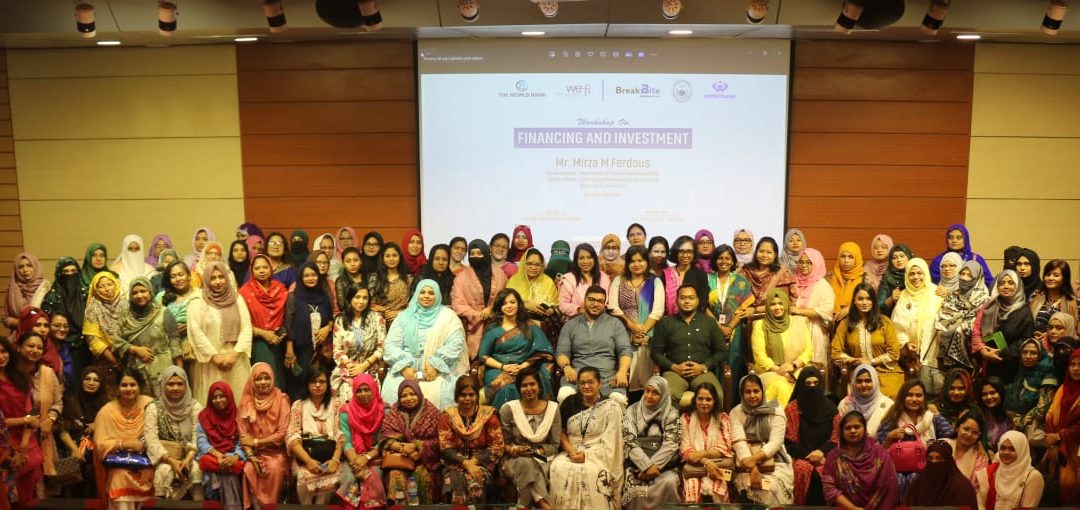
by BreakBite Editorial Wing | May 2, 2024 | WSME Business Insights
Empowering Women Entrepreneurs: Successful 5th Physical Workshop on Financing and Investment at NSU Campus
Date: May 2, 2024
Time: 10:30 AM
Location: North South University Campus
The Women Entrepreneurs Business Support Center, a pivotal initiative under the We-Fi project of the World Bank and organized by BreakBite in collaboration with North South University, successfully conducted its 5th physical workshop on Financing and Investment on May 2, 2024, at the NSU Campus. The workshop, led by Mr. Mirza M Ferdous, Senior Lecturer in the Department of Finance & Accounting at NSU, attracted over 120 women entrepreneurs eager to enhance their financial acumen.

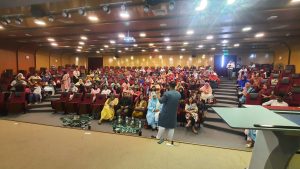
The primary objective of the workshop was to address questions submitted by the participants. The organizers carefully filtered, combined, and rephrased these queries into seven broad questions covering various aspects of financial management. A secondary goal was to respond to any additional questions from the audience at the end of the presentation.
The workshop began with a concise yet comprehensive overview of financial management, breaking it down into three functional areas: operations, investments, and financing. Given the workshop’s time constraints and scope, it was emphasized that the main focus would be on the subject of “risk.”
Understanding Risk: Risk was redefined not as a negative concept associated with loss, but as the idea of uncertainty, described mathematically as “we don’t know exactly what will happen in the future.” This concept of risk was a recurring theme throughout the workshop, with various facets of risk and risk management discussed in detail.
Detailed Q&A Session:
- Current Financial Trends: The first question addressed current trends in the financial and investment landscape, emphasizing the need for digitization. The discussion highlighted the importance of maintaining clear digital records for businesses to be eligible for financing opportunities, detailing the steps towards achieving digitization.
- Capital Structure and Cash Flow Optimization: The second and third questions focused on capital structure and cash flow optimization. The relationship between enterprise value, equity, and debt was explained, followed by an in-depth overview of cash flow management.
- Sources of Funding: The fourth question explored various sources of funding, highlighting their characteristics and pointing out unreliable sources to avoid, such as “shomobai shomities.” The significance of digitization and structured record-keeping was reiterated.
- KPIs and Financial Health: The fifth question, primarily academic, dealt with key performance indicators (KPIs) for measuring a business’s financial health. The discussion centered around the cash conversion cycle, cash ratio, and revenue growth, making it easy for the audience to grasp.
- Risk and Exit Strategies: The last two questions involved a detailed discussion on risk and exit strategies. Revisiting the concept of risk, the workshop drew connections between uncertainty and all the questions addressed.
The workshop saw active participation from the audience throughout, with the speaker encouraging questions. The Q&A session extended beyond the workshop, with participants seeking investment advice, clarifications on business structures, and discussions on various savings instruments. The workshop was engaging, beneficial, and well-received by all participants, providing valuable insights into financial management and fostering a deeper understanding of risk and its implications.
The Women Entrepreneurs Business Support Center, supported by BreakBite, continues to play a crucial role in helping women navigate the complexities of financial management and investment, equipping them with the knowledge and skills needed for sustainable growth.
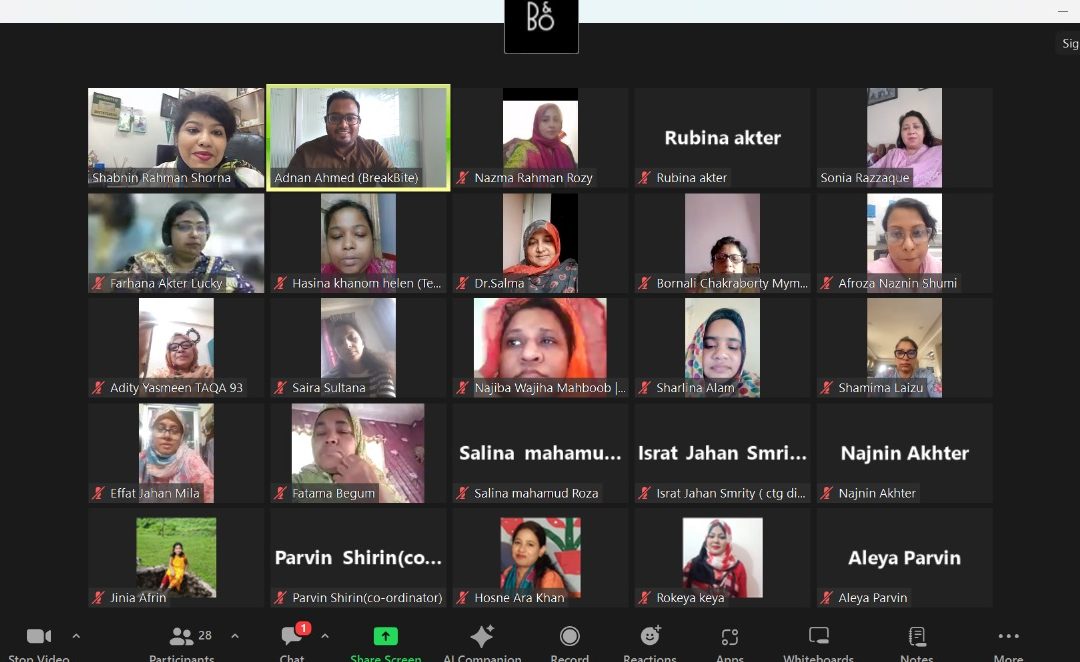
by BreakBite Editorial Wing | Apr 27, 2024 | WSME Business Insights
Empowering Women Entrepreneurs: Successful Online Q&A Webinar on HR Strategy by WSME Business Support Center
Date: April 27, 2024
Time: 1:00 PM to 2:15 PM
Mentor: Shabnin Rahman, Senior Lecturer, Department of Management, NSU
The Women Entrepreneurs Business Support Center, a key initiative under the We-Fi project of the World Bank, successfully hosted an enlightening online Q&A webinar on HR Strategy on April 27, 2024. The webinar was led by Shabnin Rahman, Senior Lecturer in the Department of Management at North South University, and focused on innovative human resource strategies for small and medium-sized enterprises (SMEs).
In her opening statement, Shabnin Rahman highlighted the financial hardships commonly faced by SMEs, which often hinder their ability to invest in attractive HR strategies. However, she emphasized that SMEs could implement effective HR strategies without incurring significant expenses. The webinar covered crucial HR topics, including:
- Hiring Strategy
- Training and Development Strategy
- Retention
- Employees’ Expected Behavior & Ethical Issues
The discussion was highly interactive, with many women entrepreneurs sharing their experiences and plans for managing and utilizing their workforce. Rahman provided practical examples and insights, illustrating how SMEs can adopt HR strategies without a designated budget.
Hiring Strategy: Rahman explained that hiring can be done cost-effectively. She suggested leveraging networks to search for employees, offering incentives to team members, and instituting a “day in the life” program to assess candidates’ passion for the job. Ms. Shahina agreed, noting that entrepreneurs could indeed hire without significant expenses by following these strategies.
Training and Development: Due to financial constraints, women entrepreneurs often cannot hire expert workers and must train their employees from the ground up. Rahman emphasized the importance of a proper training and development strategy, especially when the business is on the verge of expanding and introducing new products.
Retention: Entrepreneurs expressed concerns about retaining employees after investing in their training, as trained workers often leave for better-paying jobs or start their own businesses. Rahman offered several key points to enhance employee retention:
- Make workers feel connected to the business.
- Ensure employees feel like an essential part of the team.
- Foster a team-oriented environment without hierarchical barriers.
- Always pay employees on time and maintain a safe, healthy working environment.
- Provide small perks, such as free beverages and occasional team meals.
- Offer moral support and reasonable financial advances when needed.
Ethical Issues: Rahman addressed concerns about employees engaging in unethical practices, such as sharing product designs and sensitive business information. She advised dealing with such issues professionally by terminating unethical employees promptly and ensuring that employees do not feel indispensable.
During the webinar, Rahman shared insights from the Western business world, where employees handling customers sign documents committing to the principle that “Customer is always right.” This practice fosters a culture of respect and attentiveness towards customers, which many participating entrepreneurs found valuable.
The session was highly productive, providing women entrepreneurs with practical HR strategies and fostering a deeper understanding of effective workforce management. The Women Entrepreneurs Business Support Center continues to empower women entrepreneurs by offering valuable resources and insights through such webinars.







